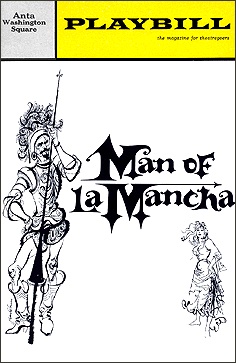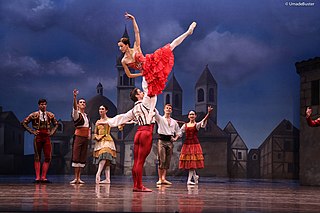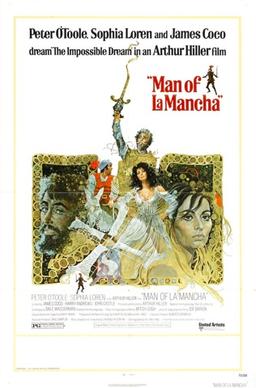
Don Quixote is a Spanish epic novel by Miguel de Cervantes. It was originally published in two parts, in 1605 and 1615. Considered a founding work of Western literature, it is often labelled as the first modern novel and one of the greatest works ever written. Don Quixote is also one of the most-translated books in the world and one of the best-selling novels of all time.

Man of La Mancha is a 1965 musical with a book by Dale Wasserman, music by Mitch Leigh, and lyrics by Joe Darion. It is adapted from Wasserman's non-musical 1959 teleplay I, Don Quixote, which was in turn inspired by Miguel de Cervantes and his 17th-century novel Don Quixote. It tells the story of the "mad" knight Don Quixote as a play within a play, performed by Cervantes and his fellow prisoners as he awaits a hearing with the Spanish Inquisition. The work is not and does not pretend to be a faithful rendition of either Cervantes' life or Don Quixote. Wasserman complained repeatedly about people taking the work as a musical version of Don Quixote.

La Mancha is a natural and historical region in the Spanish provinces of Albacete, Cuenca, Ciudad Real, and Toledo. It is an arid but fertile plateau that stretches from the mountains of Toledo to the western spurs of the Cuenca hills, bordered to the south by the Sierra Morena and to the north by Alcarria. The La Mancha historical comarca constitutes the southern portion of Castilla-La Mancha autonomous community and makes up most of the present-day administrative region.

Lost in La Mancha is a 2002 documentary film about Terry Gilliam's first attempt to make The Man Who Killed Don Quixote, a film adaptation of the 1605/1615 novel Don Quixote by Miguel de Cervantes. The documentary was shot in 2000 during pre-production and filming and it was intended as a "making-of" documentary for the film. However, Gilliam's failure to complete his film resulted in the documentary filmmakers retitling their work as Lost in la Mancha and releasing it independently.

Sancho Panza is a fictional character in the novel Don Quixote written by Spanish author Miguel de Cervantes Saavedra in 1605. Sancho acts as squire to Don Quixote and provides comments throughout the novel, known as sanchismos, that are a combination of broad humour, ironic Spanish proverbs, and earthy wit. "Panza" in Spanish means "belly".

Monsignor Quixote is a novel by Graham Greene, published in 1982. The book is a pastiche of the classic 1605 and 1615 Spanish novel Don Quixote by Miguel de Cervantes with many moments of comedy, but also offers reflection on matters such as life after a dictatorship, Communism, and the Catholic faith.

Francis Finlay, was an English actor. He earned an Academy Award nomination for his performance as Iago in Othello (1965). In 1983, he was directed by Italian filmmaker Tinto Brass in the erotic classic The Key, with Stefania Sandrelli. His first leading television role came in 1971 in Casanova. This led to appearances on The Morecambe and Wise Show. He also appeared in the drama Bouquet of Barbed Wire.

The Man Who Killed Don Quixote is a 2018 adventure-comedy film directed by Terry Gilliam and written by Gilliam and Tony Grisoni, loosely based on the 1605/1615 novel Don Quixote by Miguel de Cervantes. Gilliam tried to make the film many times over 29 years, which made it an infamous example of development hell.
Don Quixote, fully El ingenioso hidalgo Don Quijote de la Mancha, is a classic novel by Miguel de Cervantes Saavedra, originally published in two parts, in 1605 and 1615.

Peter James Yates was an English film director and producer. He is known for directing such films as Bullitt (1968), John and Mary (1969), The Friends of Eddie Coyle (1973), Breaking Away (1979), and The Dresser (1983). He received nominations for four Academy Awards, three BAFTA Awards, and two Golden Globe Awards.

Don Quixote is a ballet in three acts, based on episodes taken from the famous novel Don Quixote de la Mancha by Miguel de Cervantes. It was originally choreographed by Marius Petipa to the music of Ludwig Minkus and first presented by Moscow's Bolshoi Ballet on 26 December [O.S. 14 December] 1869. Petipa and Minkus revised the ballet into a more elaborate and expansive version in five acts and eleven scenes for the Mariinsky Ballet, first presented on 21 November [O.S. 9 November] 1871 at the Imperial Bolshoi Kamenny Theatre of St. Petersburg.
I, Don Quixote is a non-musical play written for television and directed by Karl Genus. It was broadcast in season 3 of the CBS anthology series DuPont Show of the Month on the evening of November 9, 1959. Written by Dale Wasserman, the play was converted by him ca. 1964 into the libretto for the stage musical Man of La Mancha, with songs by Mitch Leigh and Joe Darion. After a tryout at Goodspeed Opera House in Connecticut, Man of La Mancha opened in New York on November 22, 1965, at the ANTA Washington Square Theatre.

Man of La Mancha is a 1972 film adaptation of the Broadway musical Man of La Mancha by Dale Wasserman, with music by Mitch Leigh and lyrics by Joe Darion. The musical was suggested by the classic novel Don Quixote by Miguel de Cervantes, but more directly based on Wasserman's 1959 non-musical television play I, Don Quixote, which combines a semi-fictional episode from the life of Cervantes with scenes from his novel.
Don Quixote (1933) is a British-French film adaptation of the classic Miguel de Cervantes novel, directed by Georg Wilhelm Pabst, starring the famous operatic bass Feodor Chaliapin. Although the film stars Chaliapin, it is not an opera. However, he does sing four songs in it. It is the first sound film version of the Spanish classic. The supporting cast in the English version includes George Robey, René Donnio, Miles Mander, Lydia Sherwood, Renée Valliers, and Emily Fitzroy. The film was made in three versions—French, English, and German—with Chaliapin starring in all three versions.
Don Quixote is an unfinished film project written, co-produced and directed by Orson Welles. Principal photography took place between 1957 and 1969. Test footage was filmed as early as 1955, second-unit photography was done as late as 1972, and Welles was working on the film intermittently until his death in 1985. The film was eventually edited by Jesús Franco and was released in 1992, to mixed reviews.
Marilyn Louise Brown was an American actress who performed on stage and in television dramas and feature films. She was the sister of actor/author/playwright Barry Brown and author James Brown.

Donkey Xote is a 2007 3D computer-animated children's film produced by Lumiq Studios. A co-production between Spain and Italy, the film is directed by José Pozo and written by Angel Pariente, based on the Miguel de Cervantes novel Don Quixote, and features the voices of Andreu Buenafuente, David Fernández, Sonia Ferrer and José Luis Gil. The film has gained notoriety as a mockbuster as the lead character Rucio bears an intentional resemblance to Donkey from the Shrek film series, along with the poster having the tagline "From the producers who saw Shrek".
Robert Halmi (Sr.) was a Hungarian-born producer of movies and mini-series for television.

El Quijote de Miguel de Cervantes is a Spanish prime-time television series based on the 17th century novel Don Quixote by Miguel de Cervantes. Produced by Emiliano Piedra for Televisión Española, it was directed by Manuel Gutiérrez Aragón, with screenplay by Camilo José Cela and starring Fernando Rey as Don Quixote and Alfredo Landa as Sancho Panza. Its five episodes adapting the first part of the novel were broadcast on La Primera of Televisión Española in 1992.













